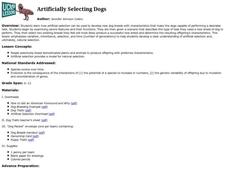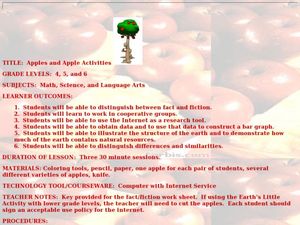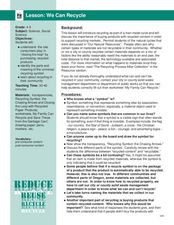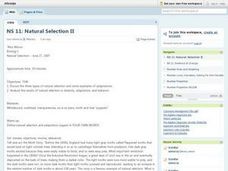Curated OER
Crane, London, and Literary Naturalism
High schoolers read London's "To Build a Fire" and Crane's "The Open Boat" and compare and contrast the authors' style as they explore the genre known as American literary naturalism.
EngageNY
Reading about the Author’s Perspective: Why Do Authors Write about Natural Disasters?
It's all about perspective. Scholars view a note from the author in Eight Days. They determine the gist and discuss what they can learn about the author's background based on the note. They then complete a fishbowl activity in which they...
University of California
Artificially Selecting Dogs
Selective breeding has resulted in some novel and beautiful or useful dogs over the years. Using the American Foxhound as an example, genetics learners find out how and why they came about. Then, in small groups, they select breeds to...
Curated OER
Apples and Apple Activities
Young scholars investigate apples. In this reading comprehension lesson, students read a book about apples then compare and contrast, make graphs, distinguish between fact and fiction and work in groups. Young scholars work in groups to...
Curated OER
Goals, Interactions and Outcomes
Students recognize both sides of a dilemma through use of a Human Interaction Outline. In this Goals, Interactions and Outcome lesson plan, students create a diagram to show opposing views of fishermen and oil companies. Students...
Pennsylvania Department of Education
Wind and Water Wheels
Students identify wind and water as natural resources that create energy. In this natural resources and energy use lesson, students work in groups to construct a pinwheel, then explore the effects of wind and water on the pinwheel....
Curated OER
Renewable vs. Non-Renewable Resources
Fifth graders, after brainstorming why conservation of resources is important, distinguish between renewable and non-renewable resources. They make a list of different types of natural resources on the board and then sort them into two...
Curated OER
We Can Recycle
Young scholars analyze the symbol for recycling. For this recycling lesson, students define and identify various symbols and draw the symbol for recycling. Young scholars investigate ways to keep natural resources in the recycling loop.
Curated OER
Tree Lesson
Students compare and contrast characteristics of conifer and hardwood trees. After collecting samples of branches around the school, they classify the branch as hardwood or conifer. Groups of students identify given twigs. They go...
Curated OER
Recycling
Students investigate how to reduce, recycle, and reuse items in order to conserve natural resources. They complete a trash graphing activity after discussing different types of trash. Finally, the examine ways to buy recycled products to...
Curated OER
Modeling Natural Disaster with Mathematical Functions
Ninth graders investigate the functional relationship of different environmental phenomena. In this math lesson, 9th graders create models of various natural disasters. They use logarithmic and exponential functions to interpret...
Curated OER
Poetry and Nature
Young scholars observe an object in nature and record them. In groups, they create a group poem about the same object. They create their own poem based on another object using other their senses to help them. They share their poems with...
Columbus City Schools
Biome Basics with a Disastrous Twist
Bored with your current biome bag of tricks? This bundle is a bountiful bag of biome fun! Travel the globe with seventh graders and explore the biotic and abiotic factors that define our world's biomes. Then, introduce a little chaos to...
Curated OER
Coal Supply and Demand
A hands-on simulation perfect for an economics lesson, young learners investigate the availability of different sources of natural energy (coal, natural gas, oil, solar, and nuclear) and how this availability affects their cost. Simulate...
Curated OER
Natural Selection II
Students participate in a discussion about the three types of natural selection. In groups, they identify examples of adaptations from photographs. To end the lesson, they analyze results of natural selection in adaptation, behaviors...
Curated OER
Renewable Resources: Ancient Civilizations
Students examine how ancient people used natural resources. In this renewable resource lesson plan, students will be put into 5 groups each focusing on a different past civilization. Each group will identify they types of resources their...
Curated OER
Natural Disasters
Students create an expressive painting documenting their experience of a storm. They create a slide show presentation comparing and contrasting the impact and the response to a natural disaster in the 19th century with the impact...
Curated OER
Exploring Nature: Powerful Forces
Students observe samples of artwork which use line, shape, and form to show movement and depict natural forces of nature. They create their own piece of artwork that shows a natural force and movement and then write a descriptive...
Curated OER
Our Disastrous World
Learners explore natural disasters around the world from the experiences of other students, friends and families. They collaborate with countries such as Japan, China, India, Australia, Russia, Great Britain as well as from the United...
Curated OER
A Model for Natural Selection- Spaghetti Worms
Does the early bird really get the worm? If so, which color of worm does it prefer? In an exciting and easy week-long field investigation, young field biologists set up a one square meter feeding area for birds. If you have a webcam,...
Virginia Department of Education
Three Types of Rocks
Rock out with the second installment of a five-part series on earth materials and processes. Your budding geologists make observations of given rock samples and posit classification systems for rocks. They then learn about the accepted...
Curated OER
In Case of Emergency
A natural disaster could strike at any time: do your learners know the school and community emergency plans? Start the school year by honing research and speaking skills in a practical way with this preparedness lesson plan. Youngsters...
Curated OER
Rocks and Minerals
Review the difference between rocks and minerals using this resource. Learners identify and investigate the physical properties of these objects. They create a Venn diagram to compare and contrast types of rocks. This is a motivating way...
Curated OER
Naturally Disastrous
Students examine the types and effects of natural disasters. In this natural disaster lesson, students study the different types of natural disasters including; avalanches, earthquakes, floods, hurricanes, and tornadoes. They investigate...

























